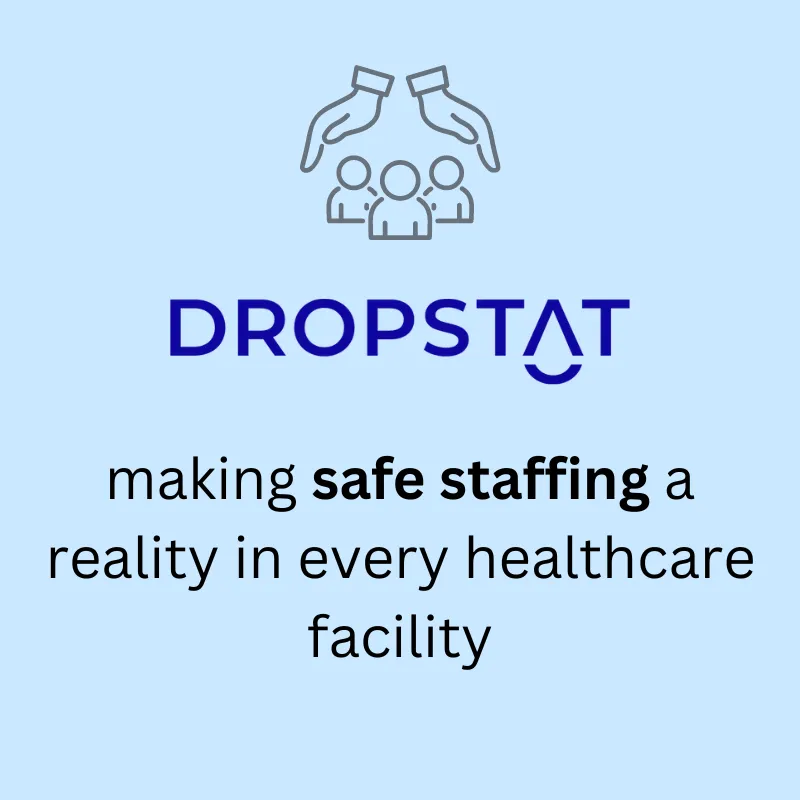Dropstat’s Clickable Guide to Types of Nursing Specialties
What does a nurse practitioner do?
What is an NP’s scope of practice? Beyond the clinical responsibilities of registered nurses, other healthcare services that nurse practitioners are qualified to oversee include:
- prescribe medication
- order diagnostic tests
- manage treatment regimens and generate care plans
- provide primary care services
Even with this broader scope of care, some of the tasks nurse practitioners are not licensed to complete are:
- performing surgeries
- signing death certificates
- signing birth certificates
Nurse practitioner autonomy
Given that nurse practitioners have the ability to diagnose, prescribe, and treat, they are also able to practice independently, without physician supervision, in many states, including the District of Columbia, California, and Colorado, among many others. However, other states do require physician supervision.
Nurse practitioner specialties
Nurse practitioners typically work in many different specialties enabling them to be:
- family nurse practitioners
- acute care nurse practitioners
- oncology nurse practitioners
- pediatric nurse practitioners
- orthopedic nurse practitioners
- neonatal nurse practitioners
- women’s health nurse practitioner
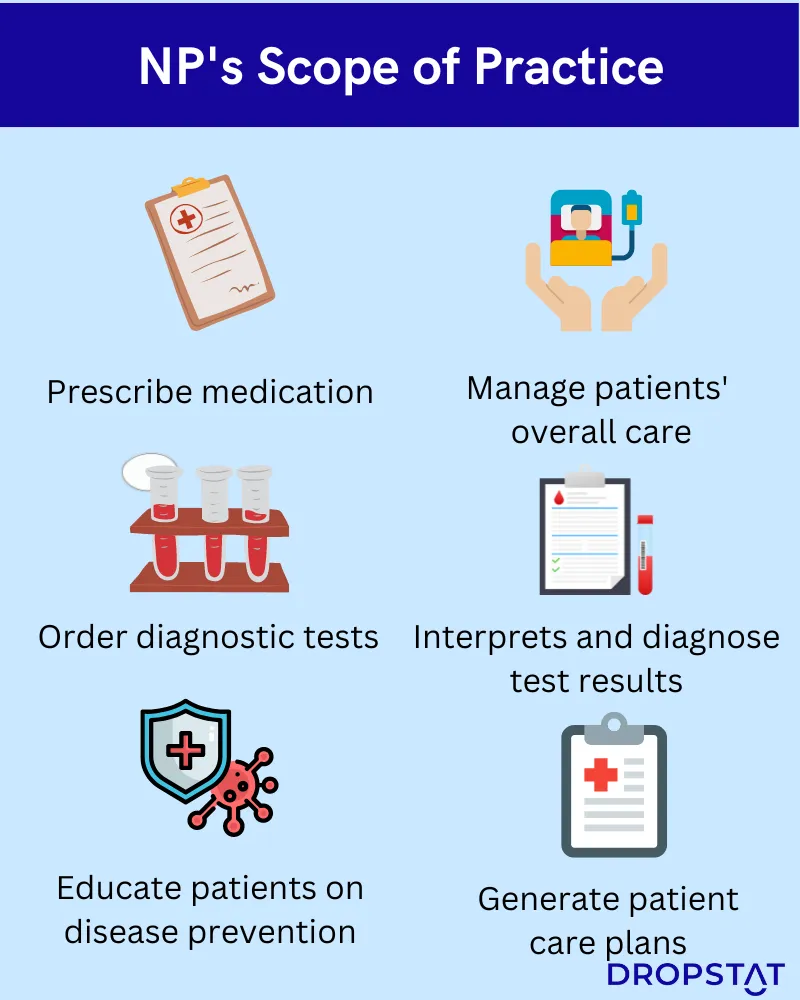
What is an NP’s (nurse practitioner) education
A nurse practitioner is a higher-level nursing role than a registered nurse. Nurse practitioners follow a rigorous path, including passing the national council licensure exam (NCLEX-RN) and obtaining a nursing degree, followed by enrolling in a graduate program for additional education and passing the national certification exams. Passing this exam is the last step to practicing as a licensed nurse practitioner. This academic journey typically requires six to eight years to complete, which is why their work is compensated at a higher rate than nursing professionals with a more limited educational background.
Healthcare facilities can maximize the skillset and abilities of nurse practitioners by encouraging and assisting with specialty training to limit the need to hire additional specialists. By optimizing nurse practitioners’ scope of practice, healthcare facilities ultimately reduce costs associated with hiring additional staff while increasing retention by investing in current employees.
Where do nurse practitioners rank in the hospital hierarchy?
Among nursing professions, nurse practitioners have a high position within the clinical care setting, considering that there are few other nursing roles that rank higher than NPs. Some other professions that rank higher within the hierarchy are the doctor of nursing practice, nurse manager/nurse supervisor, director of nursing, and chief nursing officer, as well as doctorate-level healthcare providers.
How long is a nurse practitioner license valid?
The ANPP certification requires renewal every five years to practice. However, different states have different requirements for license renewal.
The American Academy of Nurse Practitioners states that license renewal depends on obtaining 100 contact hours of continuing education which include either 25 hours of advanced practice pharmacology education or becoming a clinical preceptor. A clinical preceptor guides healthcare students while continuing to deliver patient care as an advanced practice registered nurse. However, recertification requirements and specific continuing education requirements are state-specific as well.
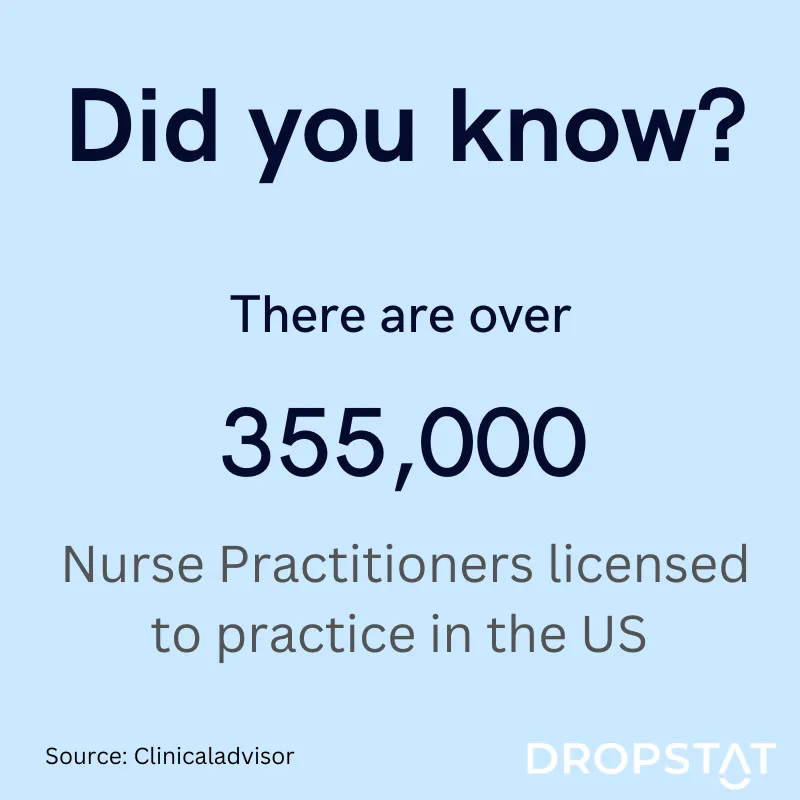
Where do NPs work?
Nurse practitioners deliver care in various different healthcare settings, including:
- hospitals
- private practices
- specialty health care services
- family medicine clinics
- primary care settings
- emergency rooms
- public health
Requirements for traveling NPs
Aside from the RN license, travel NPs are also required to earn an advanced registered nurse practitioner license, and in some locations, a medication prescribing license is also mandatory. Like the regulations for RNs, the nurse practitioner’s scope of practice is state-dependent. Some states allow nurse practitioners to practice independently from a physician, while others require physician supervision. Travel NPs also command higher salaries than permanent nurse practitioners, with California offering the highest compensation.
What is the salary for a nurse practitioner?
Although specific specialties and departments offer different salaries, the U.S. Bureau of Labor Statistics reports an average annual salary for nurse practitioners of $123,780. Nurse practitioners in psychiatry and mental health can expect to be compensated with the highest salaries among NPs in other specialties, including pediatrics, family medicine, and oncology. Work experience, practice location, and clinical setting are also factors that can increase salary among nurse practitioners.
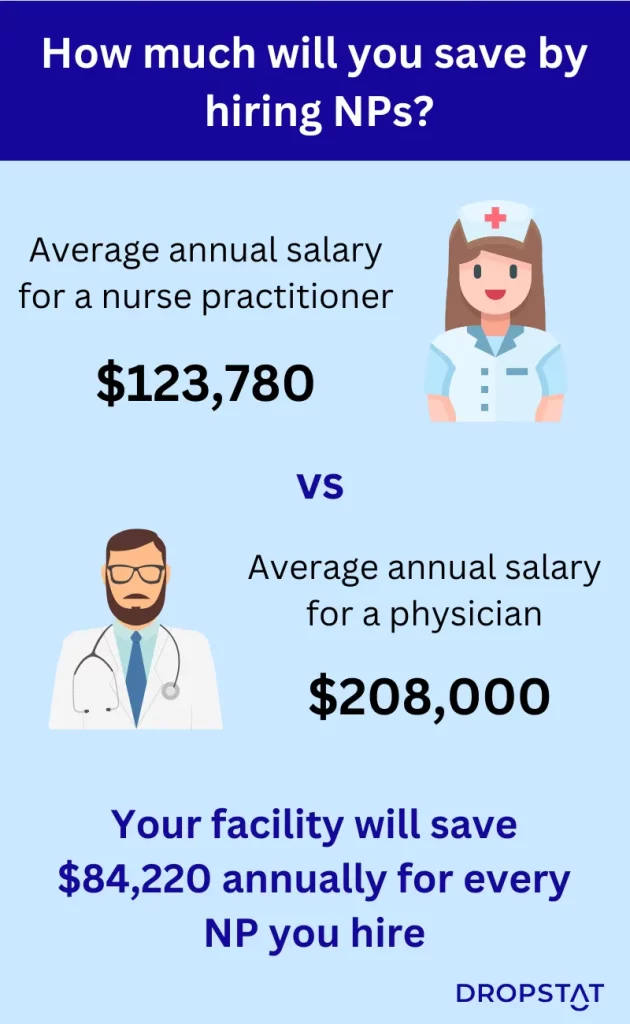
What is an NP (nurse practitioner) vs. RN
Although both nurse practitioners and RNs deliver direct care to patients, nurse practitioners have an advanced degree in nursing and are qualified to offer diagnoses, write prescriptions, and generate care plans which allow them to operate more closely to a physician’s functioning within the care team, or in some states, they can practice independently as a physician would. However, both registered nurses and nurse practitioners are required to have passed a licensing exam and must be certified to complete clinical tasks such as drawing blood and other specimens for lab work, administering medication, and charting patient records.
Nurse practitioner vs. Doctor
The primary differences between a nurse practitioner and a doctor are the amount of academic preparation, clinical training, and scope of practice. While nurse practitioners earn master’s or doctoral degrees with a nurse practitioner concentration, doctors are required to earn an MD, which typically spans four years. However, individuals must complete the MCAT exam before earning an MD, followed by the licensing examination, residency, and finally, a license to practice.
Benefits of hiring a nurse practitioner vs. a doctor
Although the scope of practice between nurse practitioners and physicians differs, a hospital may benefit significantly from hiring nurse practitioners as opposed to doctors considering that nurse practitioners can also serve as primary care providers. Nurse practitioners also possess the clinical expertise and advanced training to treat patients throughout the continuum of care. Another main benefit of hiring nurse practitioners is that their salaries are significantly less than the salaries of physicians, which enables healthcare facilities to reduce costs while still providing quality patient care.
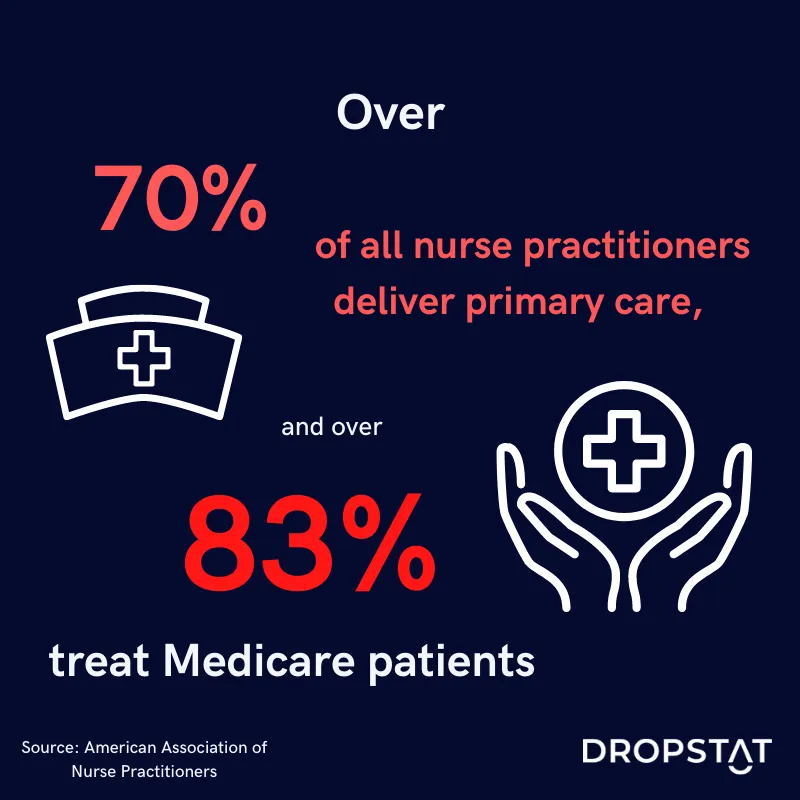
How your healthcare facility can gain from hiring more NPs
If your healthcare facility struggles with a lack of higher-level providers to treat patients, hiring more nurse practitioners will provide a greater capacity to fill the gaps in care. On the other hand, your facility may be meeting the demands of patient care but could still need more qualified staff for support or completing care tasks such as prescribing medication. In this case, hiring nurse practitioners rather than doctors will reduce unnecessary costs while ensuring that all aspects of quality care are met with the greatest resource of efficiency and patient satisfaction.
How Dropstat helps make data-driven decisions about NP staffing
Dropstat’s scheduling interface and shift tracking abilities enable your team to keep tabs on how frequently agency staff is used to fill higher-level care tasks when permanent staff cannot fill the required shifts. This data can reveal a need for more permanent staff, which allows administrators to make more precise and effective hiring decisions while minimizing costs.
In regards to nurse practitioners, administrators may find a consistent need for higher-level or advanced practice registered nurses by analyzing agency hires. This analysis allows management to make an effort to look into hiring more permanent staff, typically with a lower pay rate, which has numerous benefits such as greater team unity, increased nurse retention, reduced costs, and more efficient operations.
